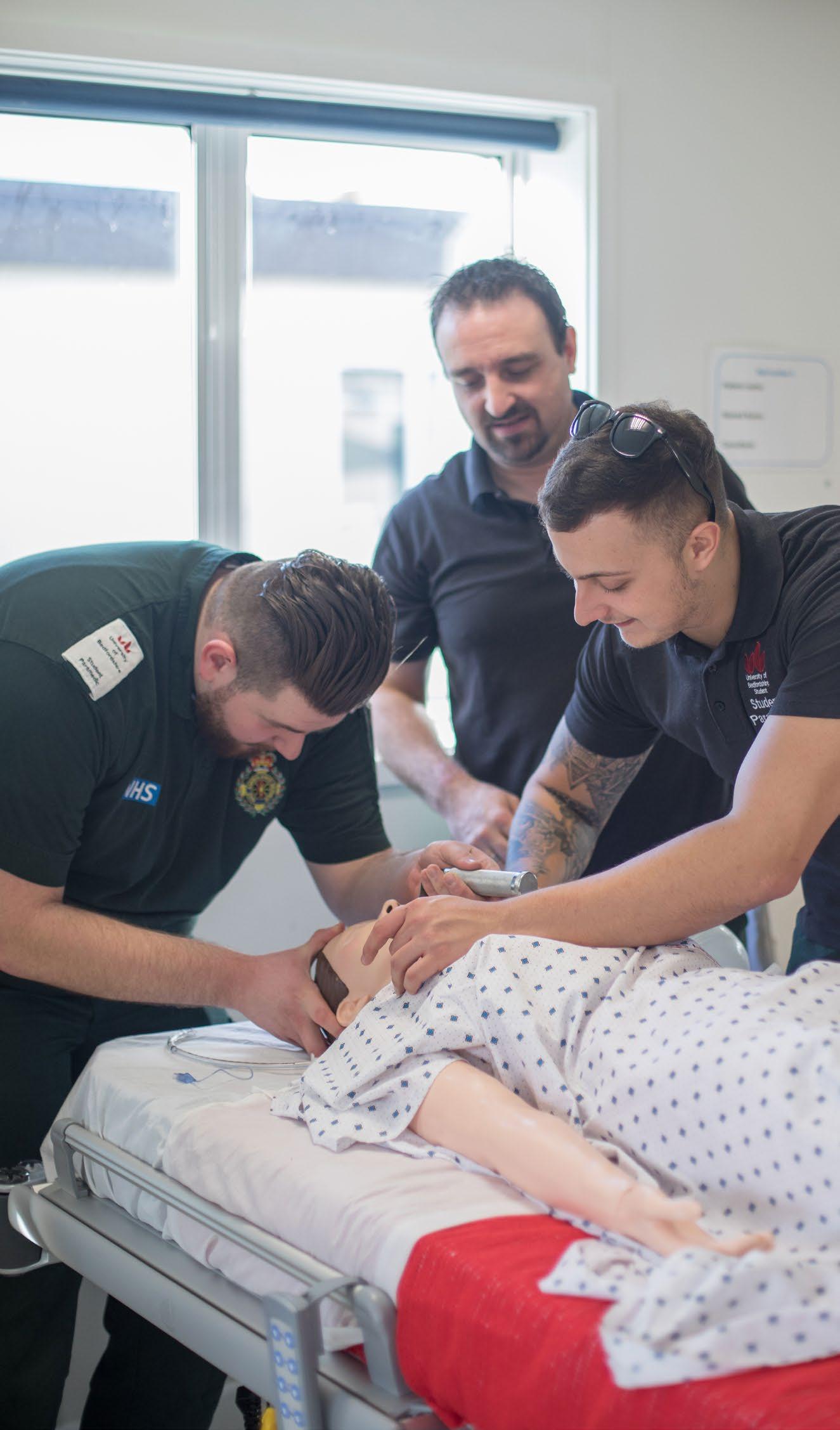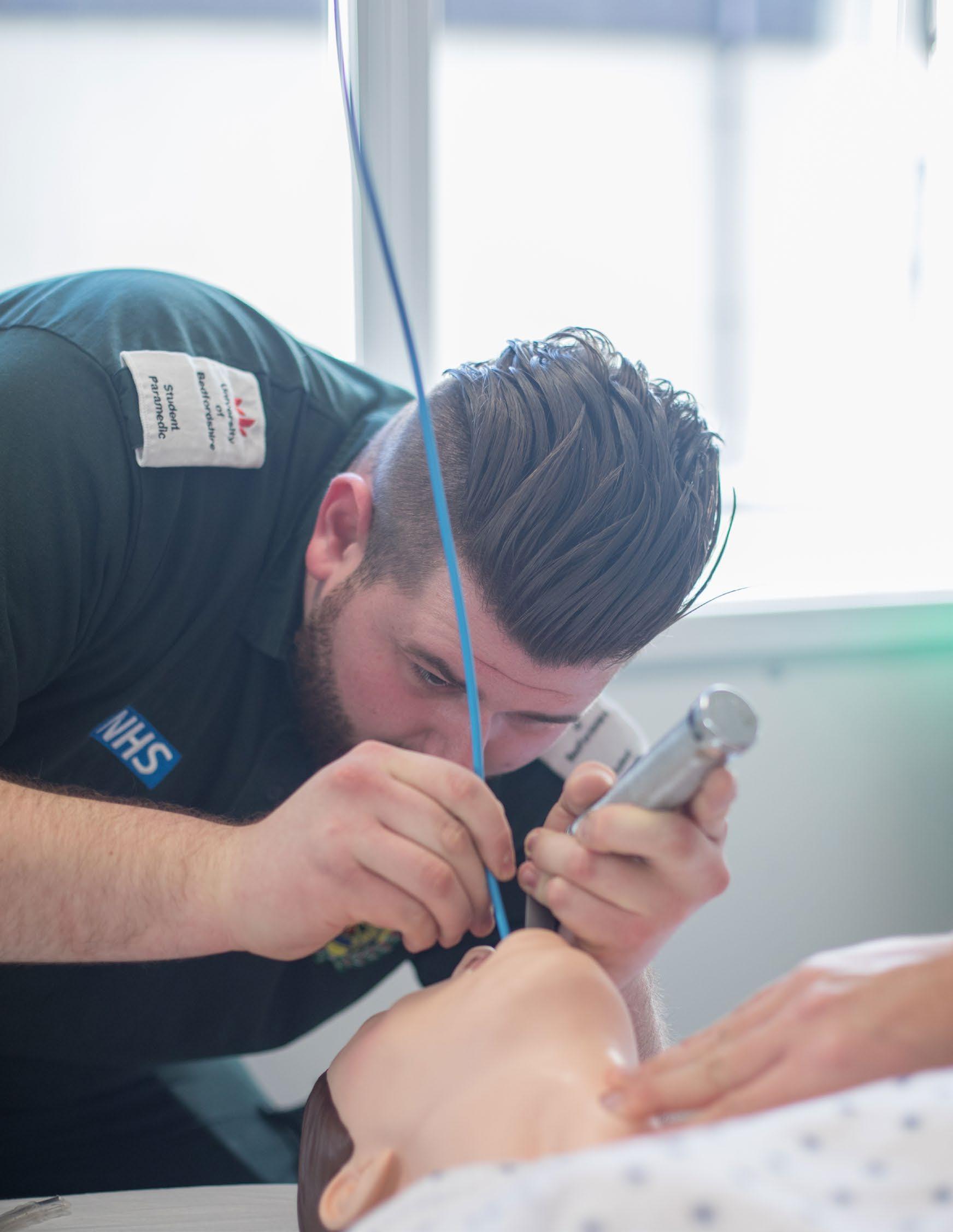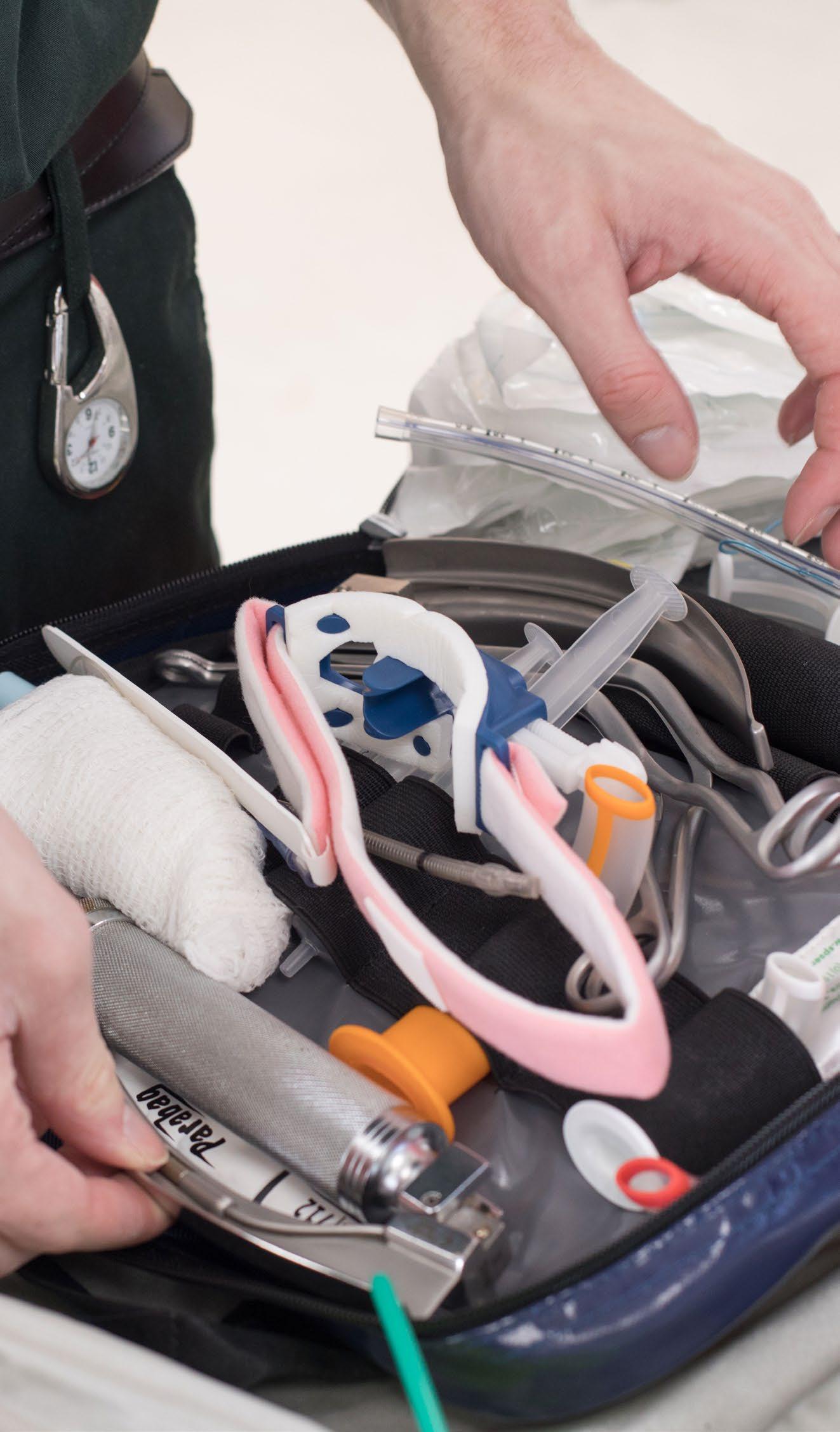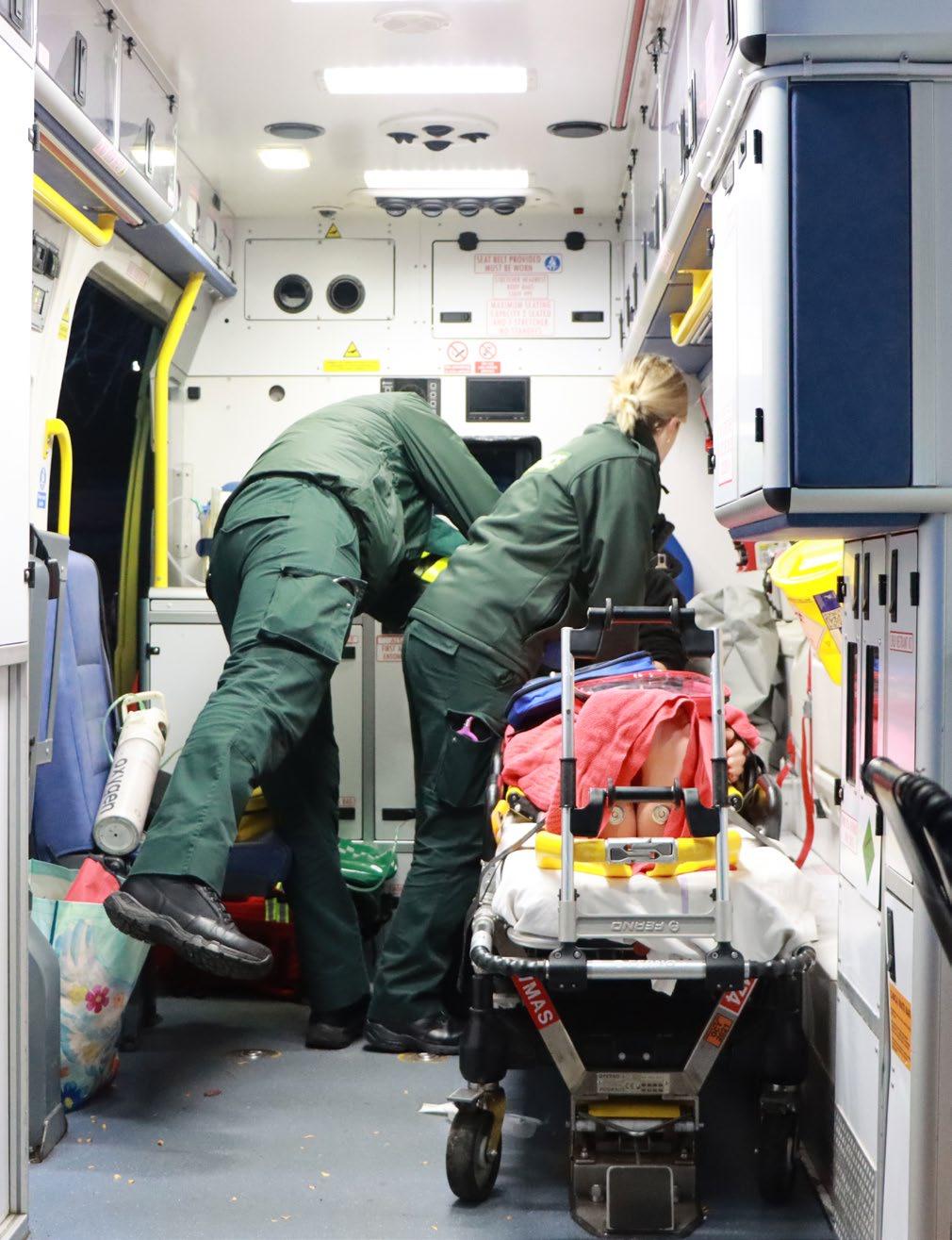


School of Society, Community and Health
Begin@Beds







School of Society, Community and Health
Begin@Beds



We are delighted that you will be studying with us. This booklet provides you with some key information that you will find useful in preparing you for your course and for your first few weeks and months at University.
Dr Lana Burroughs Head of School
Course Coordinator
Rob Cawston
rob.cawston@beds.ac.uk
Hello, my name is Rob Cawston and I am the course coordinator for Paramedic Science. We are so excited that you will be joining us in September. The first week will be an induction week where you will be introduced to your course, course team and fellow students. You’ll also have a personal tutor who is there to support you. They will have weekly office hours so you can always book an appointment if you need to chat to them, we will be there with you every step of the way.
Rob Cawston Course Coordinator
Your personal academic tutor is Email STUDENT SUPPORT SERVICES
Student Information Desk (SiD)
beds.ac.uk/sid sid@beds.ac.uk
Treehouse Community & Faith Centre
Mental Health Services
beds.ac.uk/student-support/mentalwell mentalhealth@beds.ac.uk
BedsSU (student union) help@bedssu.co.uk

The following is a typical Welcome Week schedule:
am
Day 1
pm
Introduction to: Student support services, student union and library services. Tour of campus and facilities.
Meet the course team. Ice breaker and social integration. Class Publishing (Books) and introduction to the course.
am
Day 2
Day 3 & 4
pm
A day in the life – what to expect, getting the most from Breo and Q&A with existing students. College of Paramedics presentation.
First personal academic tutor (PAT) meeting, uniform ordering & meet some of the practice education team.
Occupational health and ID and document check appointments. Student Union events.
ESSENTIAL LINKS
For more information on joining your course, visit Begin BSc Paramedic Science @Beds where you will find updated info, tips and dates of your course induction week etc.
During your first year you will study five units in four week blocks (although in the first year two of the teaching blocks are joined to make an eight week preparation before you go out on placement).
Introduction to Academic Studies
Introduction to Pharmacology
Fundamental Skills in Paramedic Practice
Heath Sciences in Paramedic Practice
Professional Values and Relationships
How to find your Timetable
Information about your learning with BREO
Get support with your learning and assignments Study Hub
Visit the Library
Begin@Beds Start your student journey
Thrive@Beds My Beds Life
Succeed@Beds Careers and Employability Service

As you enrol on your professional course you will need to complete an enhanced DBS along with ID checks and an occupational health assessment. You will also be asked to read and sign your professional studies contract which is in line with the HCPC Standards of Conduct, performance and ethics which will guide you through your 3 year degree course.
Your clinical placement will be based with one of our practice partners and you will also be given opportunities to experience different areas of practice throughout your journey to becoming a registered Paramedic.
Other than lecture blocks, you will also have ambulance placement and alternative placement blocks.
Your ambulance placement will be with the East of England Ambulance Service NHS Trust. You will be placed with a Practice Educator and will either be on a dual staffed ambulance or a Rapid Response Vehicle. You will either be based in the North Bedfordshire (Kempston, Bedford and its satellite stations) or South Bedfordshire (Luton and its satellite stations).
Your alternative placement will be in a cross-sector organisation of which examples include:
• A Hospice
Keech (Luton) or St Johns (Sue Ryder)
• Welfare
Noah Enterprise SMART CJS
• Health Visitor
• Ambulance Operations Centre (AOC)
• Bedford Day Care Hospice
• Hospital Wards
Placements are for one week and include a combination of long or short shifts. You will often get three placements in the block. You will also have a Student Directed Option where you may be able to pursue an interest area or use for independent study or virtual placement.


The course assessment strategy is closely aligned to the teaching and learning strategy which is designed to:
• have an immediate relevance to practice;
• draw on expertise-by-experience;
• foster active learning and be learner-centred in approach.
A distinct feature of the course is the range of assessment tasks, including those that allow you to undertake workplace relevant assessments that can have an immediate impact in practice. This helps put into practice what you are learning in university and increases your self-confidence.
Types of assessment for these units include:
Practical skills assessments
Essays
Personal reflections
Presentations
Pecha Kucha – a presentation form of 20 images for 20 seconds
Viva Voce – an oral exam, no writing
Dissertation (final year)
Once you have enrolled on the course you will have access to BREO, the virtual learning environment used at the University of Bedfordshire. Once you have logged in, you will have access to your course units for this academic year.
Spend some time getting familiar with its structure. The Unit Introduction folder contains information about the teaching team and an overview of the unit. The Unit Information folder contains the Unit Information Form where you can find out more detail about what the Unit will cover. The Unit Learning Materials folder is where you will find scheduled, guided and independent learning for each lecture. You may find a pre-unit activity to do. You can also look at the Assessment and Feedback folder where you find the assignments for the unit. There is a Study Support and Student Zone folder and finally a folder ‘Using BREO’ that gives you further information about using the platform.
Once you have a feel for the structure, you can then do any pre-unit activities in preparation for your lectures in your first week.
• Paramedic Science – University of Bedfordshire
• Eating and drinking on-campus – University of Bedfordshire
• Bedford campus – University of Bedfordshire
• Fatimah https://www.youtube.com/watch?v=zIktHbWzywQ&t=3s
• Jade https://www.youtube.com/watch?v=0670583NkbM

You will start with an eight week block of lectures to prepare you for your first four week ambulance placement.
After this you will rotate between four week blocks of lectures, ambulance placement and alternative placement.
As this is a professional course you are expected to complete 1000 placement hours and attend all university teaching unless you have medical exemption or extenuating circumstances.
Semester One Lectures Lectures
Semester Two Alternative Placement Lectures
Semester Three Alternative Placement Independent Study
Ambulance Placement
Ambulance Placement
Ambulance Placement

Do I need to buy any textbooks?
No, most books can be found in the library, or are available online. You can choose to purchase the recommended course bundle from Class Publishing at a discounted rate during your induction week.
Do I need to buy uniform?
You will be given a basic set of uniform. Once we have your sizes etc, these will be ordered ready for you to start ambulance placement in mid-November. The ambulance service will supply some items of Personal Protective Equipment such as helmets.
What equipment do I need to buy?
A reasonable stethoscope e.g. Littmann Classic III, fob watch, usual study materials, pens, paper, notebooks, laptop etc. This information will be sent out, with links.
Do I need to do any pre-reading?
No, although you may wish to review some human biology from previous courses at GCSE or A-level etc. Once you start the course, it is essentially full on across the three years so enjoy the summer before you start.
What happens if I miss class due to being unwell or having difficulties with childcare or travel?
We understand that everyone will face some difficulties now and again and we aim to be flexible. You are encouraged to discuss ongoing issues with your Personal Academic Tutor or Unit Lead.
Is there somewhere for me to get support if I have a learning difference such as Dyslexia?
Yes! There is plenty of help available and students may be eligible for a Learning and Teaching Agreement, stating any reasonable adjustments needed for classroom learning and examinations. There is also help available for practice based learning.
Are there clubs and activities I can get involved with?
Yes! The Student Union will provide lots of information about the sporting clubs, activities and events available for all students at UoB. For more information visit bedssu.co.uk

ESSENTIAL LINKS
Simulation suite beds.ac.uk/simulation
Learning Difference support information beds.ac.uk/student-support/disabilities2
We also have a Paramedic Society you can join.
There is a lot to take in when you begin studying on a professional course like this one. The teaching team have been working as paramedics for many years, have wide experience and different backgrounds. Here are some of our key reasons to ‘love this job’!
You will be with patients in their most vulnerable moments. This is a true privilege.
You will experience things you never thought possible.
A year after qualifying you will be able to be a practice educator and be responsible for developing other students.
You can keep studying. There are a range of roles open to experienced paramedics including HEMS, Urgent Care, Management, education, research etc.
You become part of the big ‘green’ family.
Everyone is helpful and wants you to do well.
No two days are the same. You attend a variety of calls.
Knowing you just saved someone’s life.
You will always be employable as paramedics are always in demand.
You are truly privileged to be involved with the foundations of the NHS – from ‘cradle to grave’, available and free to all. You are part of the wider healthcare team.